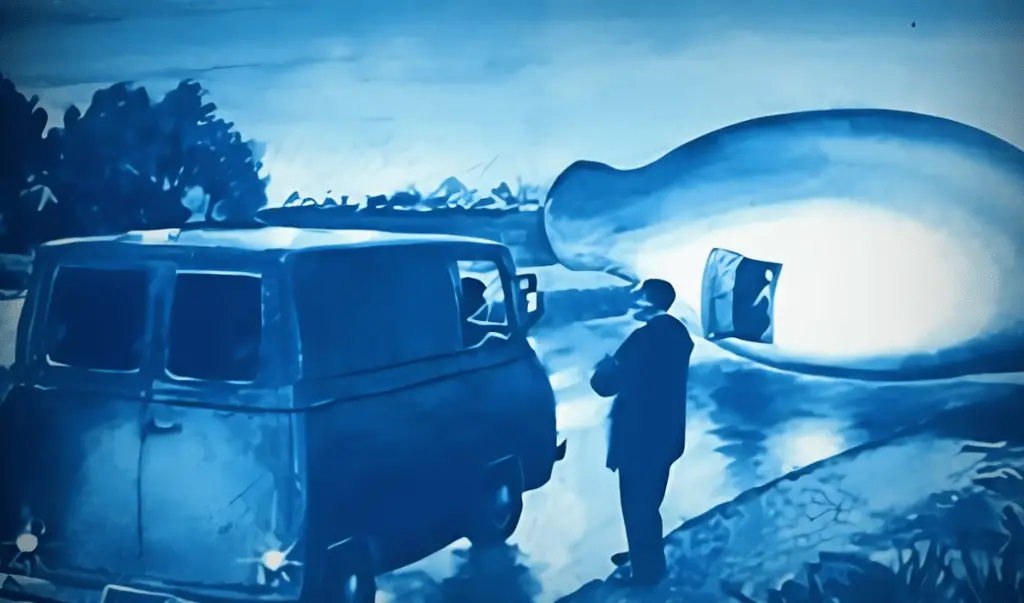
The realm of UFOlogy is no stranger to unusual narratives, often carrying tales of surreal encounters with extraterrestrial beings that straddle the boundary between fact and fiction. Few such narratives, however, are as compelling and contentious as the tale of Woodrow Derenberger’s encounters with a mysterious entity known as Indrid Cold.
Woodrow Derenberger, or “Woody” as he was commonly known, was an ordinary sewing machine salesman from West Virginia. His life was thrown into the extraordinary on November 2, 1966, when he reported encountering a metallic spacecraft on his drive home. The purported occupant of this spacecraft was a smiling man, who introduced himself telepathically as Indrid Cold from the planet Lanulos.
This narrative was laid bare in Woody’s book, “Visitors from Lanulos” (Amazon link), an account that fused extraterrestrial encounters and tales of interstellar journeys. However, skeptics and believers alike often point out inconsistencies and embellishments that make the story difficult to accept at face value.
It is critical to consider that Woody admitted to some degree of embellishment in his account, as urged by his publisher. This was confirmed by his daughter Tanya, who, though she recalls spending time with Indrid and his crew, was only three years old at the time.
Psychological studies have raised questions about the reliability of children’s memories, particularly in distinguishing between experienced events, dreams, and second-hand narratives. This may cast a shadow of doubt over Tanya’s recollections. Furthermore, her narrative has fluctuated over the years, at one point associating Indrid Cold with the famous alien figure, Valiant Thor.
VIDEO: The Why Files – Indrid Cold, the Truth about Planet Lanulos and the Mystery of the Smiling Man
Woody’s encounter with Indrid Cold sparked an avalanche of attention, leading to numerous TV and radio interviews. However, the limelight eventually turned harsh, leading to job loss, social ostracism, and even his wife’s departure with a UFO investigator working on Woody’s case.
A particularly damning incident involved a caller named Tom during a TV interview, who claimed to also know Indrid Cold. Tom, later revealed as science fiction writer Thomas F. Monolioni, tricked Woody into confirming a series of fabricated details about Lanulos. This prank, when exposed, discredited Woody’s account further.
Despite the controversy, Indrid Cold’s story continues to have fervent believers who are out there even today, narrating the tale and attempting contact. Their conviction presents a compelling counter-narrative to the skeptic’s viewpoint.
While the factual authenticity of Indrid Cold’s story is contestable, the underlying message is strikingly profound. Indrid Cold advocated for honesty about extraterrestrial contact, projecting a vision of a world where acceptance of our cosmic neighbors could herald an era of global unity, void of territorial wars and racial division. It is a message that transcends the realm of UFOlogy, urging humanity to perceive itself as one global race, the human race.
Regardless of belief in the story’s veracity, it underscores the power of narratives to weave a compelling tapestry of ideas that can challenge our perceptions of the universe and our place in it. As the famous paranormal investigator John Keel suggested, even if the story isn’t true, it is a story worth telling. Thus, the tale of Indrid Cold remains an enduring enigma, offering a blend of intrigue, skepticism, and the enduring allure of the extraterrestrial.
Ultimately, the story of Indrid Cold is less about a man’s contact with an extraterrestrial entity and more about our collective fascination with the unknown, our desire to seek answers beyond our planetary confines, and our shared longing for universal unity. As we continue to explore the cosmos, narratives like these serve as fascinating reminders of the possibilities that may await us among the stars.

John A. Keel propounds the idea (in The Mothman Prophecies) that some of these alien entities are “cosmic jokers” – mischievous spirits taking pleasure in misinforming their human dupes and exposing them to ridicule. Keel finds warrant for this in folklore.